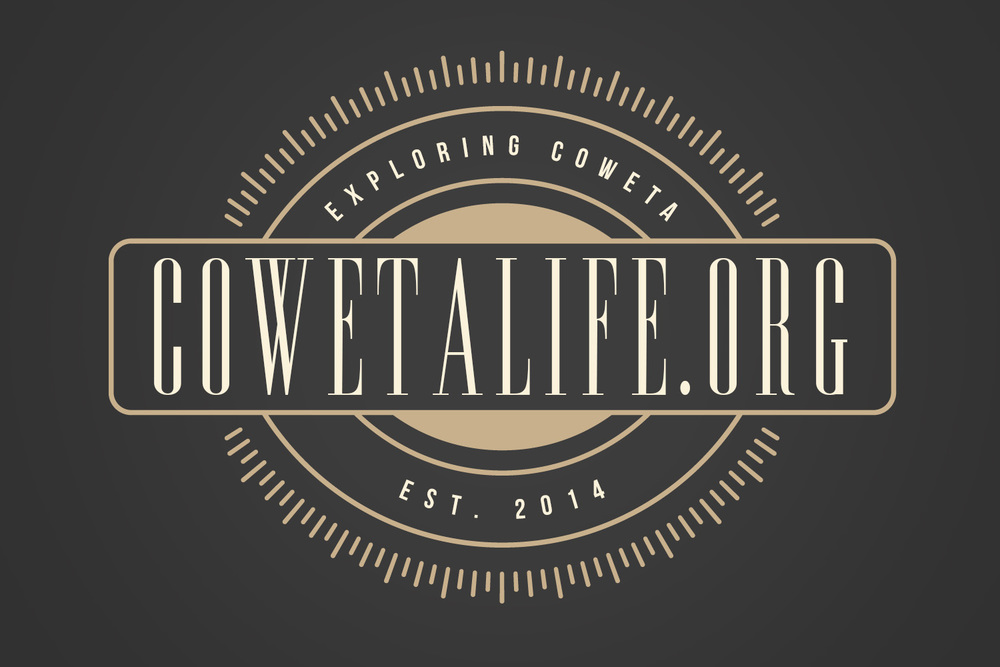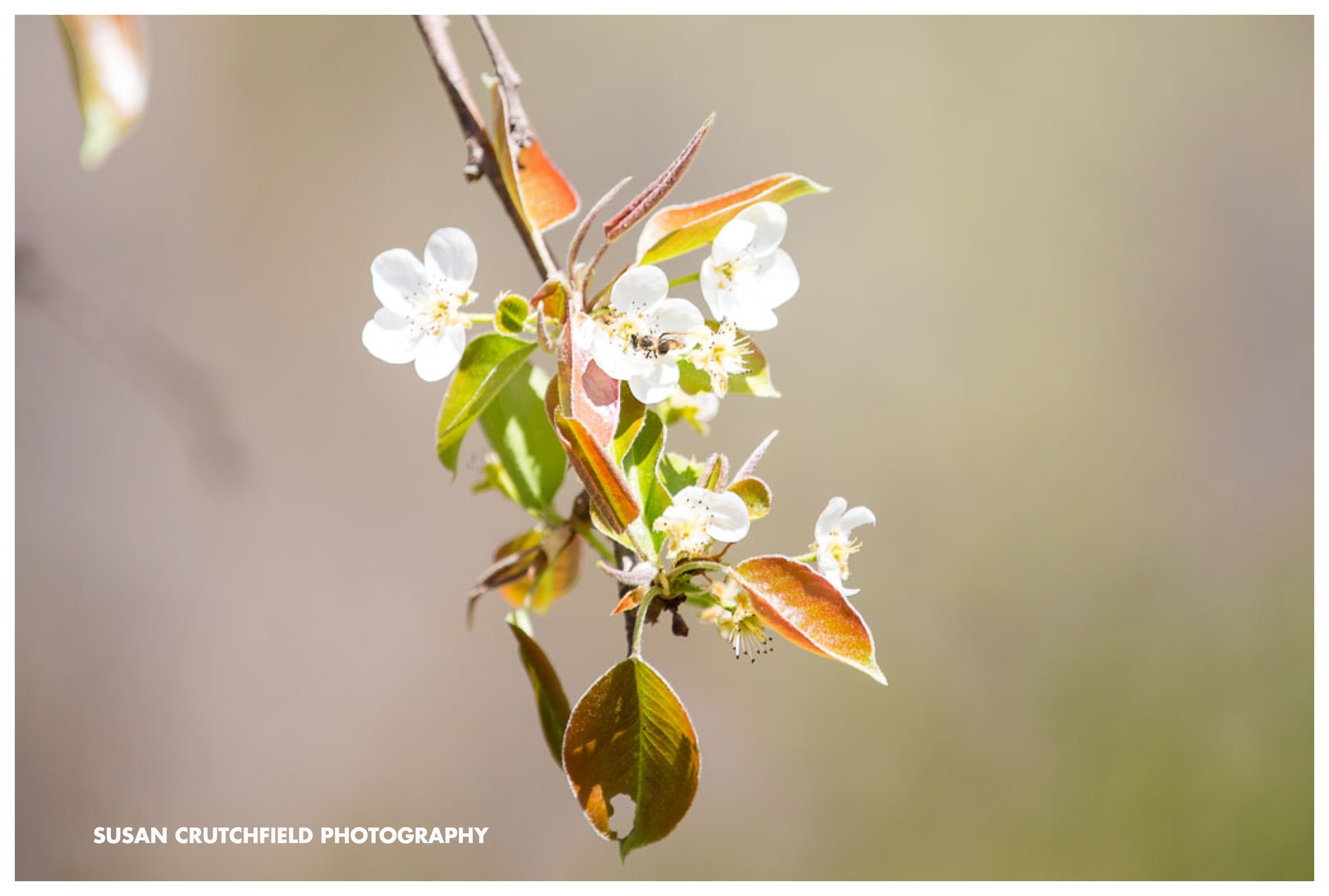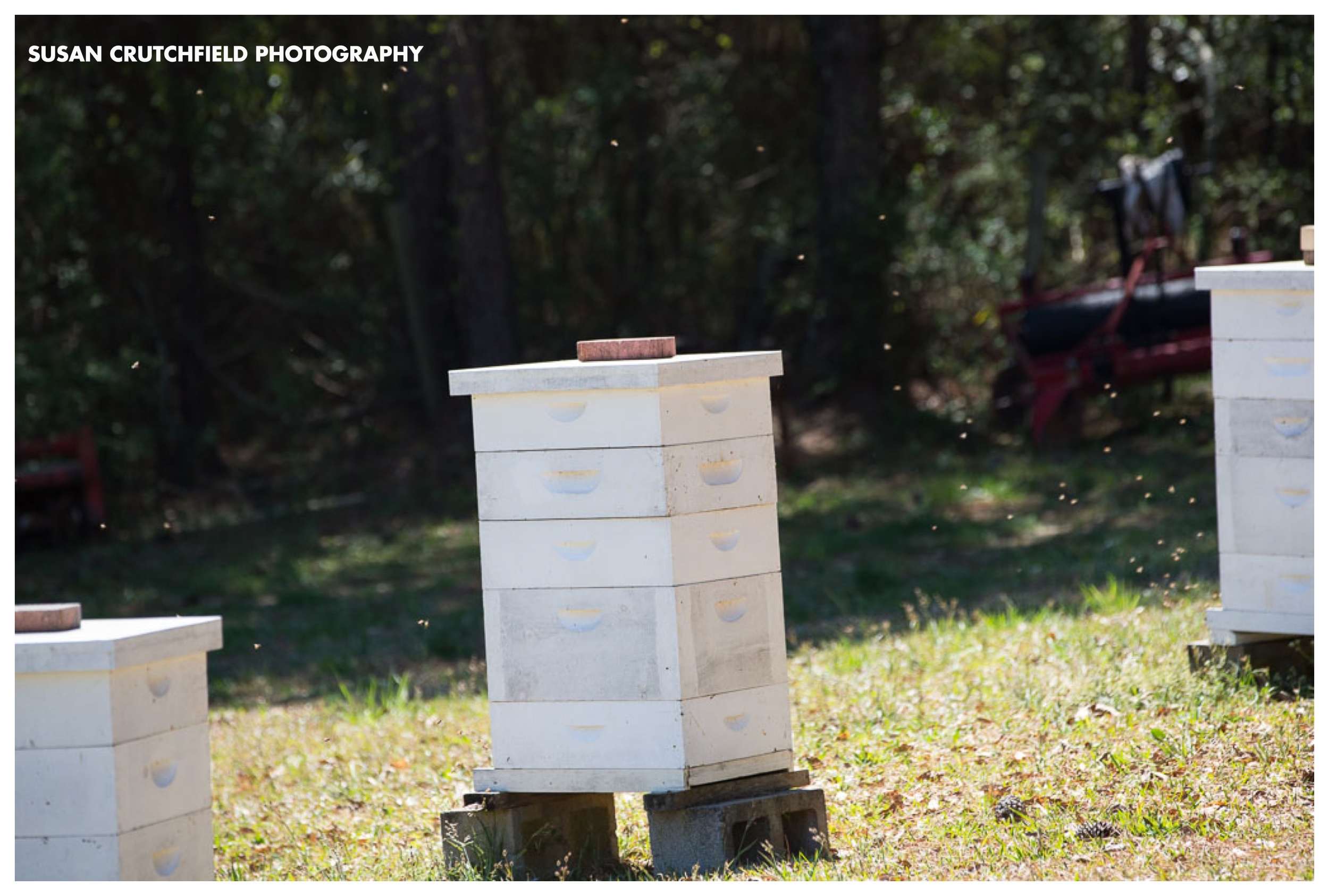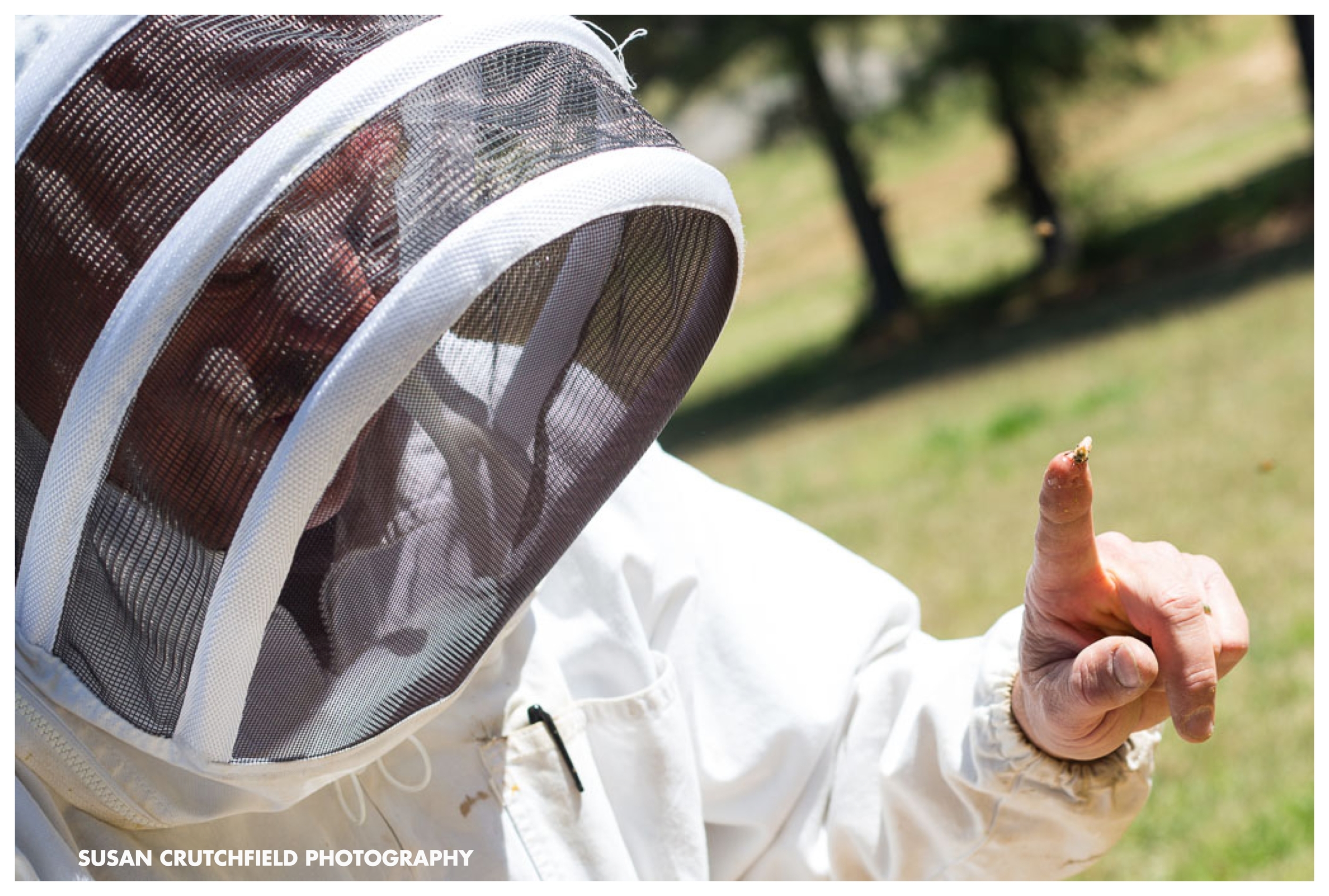PLEASE NOTE COWETA LIFE IS NOT AFFILIATED WITH ANY OF THE PLACES, PEOPLE, OR THINGS WE COVER. PLEASE CONTACT EACH BUSINESS OR PERSON DIRECTLY IF YOU HAVE QUESTIONS. SENDING AN EMAIL THROUGH OUR CONTACT PAGE WILL NOT GET YOU IN CONTACT WITH THE BUSINESS BUT WITH COWETA LIFE. WE ARE NOT ABLE TO REPLY OR FORWARD EMAILS MEANT FOR THE BUSINESSES WE COVER. THANK YOU!
Spring is in the air! Looking around Coweta, you can see the flowers starting to burst into bloom. And then there is the pollen.
The invisible sneeze maker and the not so invisible yellow coating on our cars and decks.
Those tiny granules that we find so annoying represent life.
We got the opportunity to witness one of the most important steps in the human food chain with Steve Page, president of Coweta Beekeepers Association and the owner of Barrington Farms Apiary.
He was kind enough to invite us to one of the several colonies he has around Coweta County.
We arrived at the hives excited and also a little nervous about being in such close proximity to thousands of stinging insects.
We visited the hives at the perfect time of year. The bees are busy gathering pollen and nectar and are just beginning to turn them into the fragrant, sticky honey that we love to eat!
When it comes to bees, Steve is passionate and effusive. He is a great teacher and explains the ins and outs of honey bees in simple, easy to understand terms.
Steve became interested in beekeeping around 2007 when he realized his vegetable garden wasn’t living up to its full potential because of the lack of pollinators.
He decided to remedy the problem by investing in beehives and raising his own pollinators. He became fascinated with the beekeeping process. “It’s cheaper than a bass boat and it keeps me out of trouble” he quipped.
At first, the process left him frustrated as the cold winters killed off his colonies. Purchasing new queens was a risky venture, as he never knew if the queen would even arrive on his doorstep dead or alive.
Instead of throwing in the veil like many new beekeepers, he immersed himself in the subject and studied the methods of other successful beekeepers.
He realized that the only way to be successful was to practice sustainable beekeeping. In order to achieve that, he invented a new beekeeping method for Coweta County by taking the sustainable practices of well-known keepers from around the country and adapting them to fit the conditions of this area.
And his method is working. In Georgia, the average rate of colony loss over the winter is 33 percent. Steve has reduced that over winter loss to around 16 percent using his sustainable methods.
We have to be honest, getting the chance to look inside of a working beehive is one of the most fascinating things we have ever done.
To look at the plain white boxes that house the colonies, you wouldn’t imagine the drama that is playing out just inside the wooden frames. Hive happenings are enough to make daytime soap operas seem dull and uninspired.
The first step of getting inside the hive is to smoke the bees with a cool, white pine smoke. This masks the pheromones that the bees rely on to communicate.
The smoke also serves to distract them. To bees, smoke means fire and they will try to consume as much of their precious honey as possible so they can carry it away in their digestive system before their home burns.
Of course it isn’t a real forest fire, but the distraction works perfectly and as Steve pries the top off the super (beekeeper speak for the colony boxes), the honey bees are surprisingly calm.
Almost instantly, we can smell the aromatic scents of sweet, flowery honey in the making.
After all his bee experience, Steve is still fascinated by the little insects. “It’s amazing how perfect they make their world” he marvels as he holds up a frame with faultlessly uniform hexagonal wax formations.
We could see many of the worker bees with their abdomens sticking out of the cells eating honey like there was no tomorrow.
The majority of the bees are female. They feed and raise the young, clean the hive, make the honey, forage and store nectar and pollen and care for the queen. The males, called drones, mate with a virgin queen to make new little bees.
Unfortunately for them, mating signals the end of their usefulness and they die shortly afterwards. They also have no stinger. It’s a tough life for boy honey bees.
The main concern of the hive is the queen. Without her, the population cannot grow and much of the drama centers on her.
Like every other honey bee the queen begins her life as an egg. Queen eggs are larger and as they progress through the stages of life, are only fed on royal jelly. This produces a bee that is noticeably larger than any other in the colony.
The fully formed queen emerges out of her wax-capped cell with a mission. She must be the only queen in the hive.
She makes a high-pitched sound (called piping) that calls all other virgin queens to come to her so they can fight to the death. Unlike all other female bees, the queens have a barbless stinger that allows her to sting multiple times without perishing.
The last virgin queen left takes over the colony. Her only job is to produce as many offspring as possible over the span of her life. Because all other female bees are sterile, it’s up to her to ensure the continuity of the hive.
The queen lays up to 2,000 eggs a day. She can fly up to five miles away to find suitable drones to mate with. Since drones can only fly a couple of miles from home, flying so far ensures a good genetic variety among the colonies.
The queen is constantly fed with royal jelly to ensure she stays strong, healthy and able to continuously lay eggs.
When new queen eggs are laid, the ruling queen takes around 70 percent of the hive and they fly away to find a new home. She lands on high up and the colony gathers all around her. Scout bees leave the swarm to find the perfect new place to build a hive (often a hollow tree).
We were lucky enough to visit at a time when part of a colony had just swarmed. Hundreds of honey bees were clustered together on a pine bough. We were astonished as Steve stuck his hand right on top of the swarm.
He explained to us that he could do this because the bees had no brood or honey to protect and so were not in a fighting mood.
We weren’t brave enough to test this and just watched in fascination as the bees calmly crawled around his hand.
He enjoys getting a little more up close and personal with the bees than we ever would. “I’m a crazy beekeeper” he told us, and then proved it by scooping his finger through the golden honey and sticking it directly into the hive.
The bees began to crawl on his finger licking up the honey with their long tongues (called a proboscis). The bees love the honey.
Honey is their lifeblood. It is how they make it through the winter so they can go on to make more little bees.
Caring for the brood is an extremely important part of maintaining the hive and many of the workers have tasks that just revolve around getting the young from eggs to full adults.
We got a chance to see some of the tiny curved eggs. They were so small that you have to get in very close to look at them.
Once the eggs hatch to larva, the bees are fed for a while on royal jelly and then honey and pollen. The pollen provides the source of protein that helps them mature into adult bees.
So that gritty powder that coats the world in the spring is the way plants reproduce. The bees help that by moving the pollen from the plant to plant. This makes the plants more productive, which gives us, and the animals we eat, a source of food.
Steve told us of a colony he placed by a cow field. The bees pollinated the clover that grew in the field, so that the next year the cows had more clover to eat, which is a better source of nutrients that grass. In turn, the cow’s milk production increased and the farmers had a better yield.
Not only are honey bees responsible for increasing our food yield, but they also make an incredibly delicious sweetener that is purported to have numerous health benefits.
Steve sells his honey at The Country Gardens store and at 180 Degree Farms. He also teaches workshops on sustainable beekeeping. Workshops are open to all members of Coweta Beekeepers Association. Membership is only $20, and anyone is welcome, even those outside of Coweta County.
You can visit the Coweta Sustainable Beekeeping Facebook to learn more about meetings, workshops and other upcoming events. Be sure to visit their website and subscribe to the newsletter. Steve sends out handy reminders to beekeepers to let them know what they should be attending to in their hive.
Steve has exciting future plans for expanding Barrington Farms Apiary and educating anyone who wants to learn on beekeeping in a sustainable way, so be sure to follow him.



















































